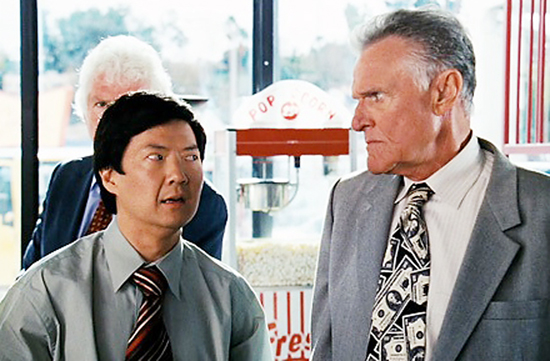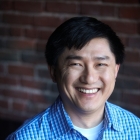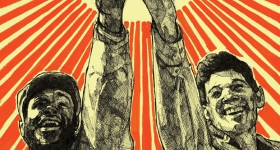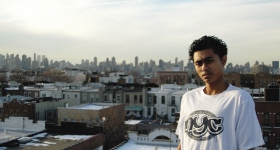 Recent protests over the Pearl Harbor scene in The Goods (in which Ken Jeong's character gets attacked by fellow car salesmen for looking Japanese) succeeded in getting the offensive bit removed from trailers. But did it really change the attitudes that screenwriters or directors have about race or stereotyping? Did it show that Asian Americans have influence over how Hollywood portrays us?
Recent protests over the Pearl Harbor scene in The Goods (in which Ken Jeong's character gets attacked by fellow car salesmen for looking Japanese) succeeded in getting the offensive bit removed from trailers. But did it really change the attitudes that screenwriters or directors have about race or stereotyping? Did it show that Asian Americans have influence over how Hollywood portrays us?
Not really, says blogger Phillip at YouOffendMeYouOffendMyFamily. He writes that the protests over The Goods and other movies with offensive scenes won't do any good because Asian Americans don't matter at the box office. Marketers have always had a hard time defining and selling to Asian Americans, a group that doesn't really exist, according to Oliver Wang at Chasing Chan.
Oliver agrees that protests alone may not change anything in Hollywood, but goes a step further by saying, "the main reason why 'Asian Americans as a whole' don't support Asian American film is because 'Asian Americans as a whole' do not exist."
The term Asian American encompasses many ethnicities, nationalities, languages and histories. There's no common thread that ties group members together. It's a political term that grew out of the Yellow Power movement of the 1970s.
Advertising agencies have told Hyphen that Asian Americans spend their money like white people, so an ad in Time or Vogue will do just fine in reaching us. (They seem to miss the point that while we consume mainstream media, we also consume ethnic media.)
I worked for a company during the mid-1990s Internet boom called ChannelA.com that had its roots as something like Hyphen but morphed into a web site about Asian culture that targeted non-Asians because it was a bigger market. I kind of felt like we were abandoning our community and made it seem like Asian Americans weren't worth the effort.
It was disheartening, but it was a pragmatic move. A lot of magazines have come and gone trying to cover the Asian American market. Hyphen is getting by with a volunteer staff and a nonprofit model, but we face many of the same obstacles as our predecessors.
One of the reasons Hyphen exists is the belief that mainstream media doesn't cover Asian Americans, however you define it, adequately or accurately. Media outlets such as Hyphen can also provide a counter balance to things like the Pearl Harbor scene in The Goods.
But is it enough just to exist? Phillip says in his post that he knows people who are protesting The Goods or the whitewashing of Avatar: The Last Airbender, but who haven't paid a dime to see movies such as Better Luck Tomorrow, Saving Face, Finishing The Game, The Motel, In-Between Days, The Debut, and Journey From The Fall. All were produced by and had casts that were primarily Asian Americans
African Americans have protested Hollywood, too, but movies aimed at black audiences also sell a lot of tickets, so that's when the studios perk up and listen. Phillip breaks down the numbers in his post.
In that same vein, it's great that Hyphen and publications like Giant Robot, Theme, East West and KoreAm Journal are still around, but like the movies, there may not be enough box office, at least for ad agencies.
Do you subscribe to Hyphen or one of the other magazines? Did you pay to see Better Luck Tomorrow? If no, why? Or, if you do subscribe and pay for movies, I'd love to hear why, too. I'm just wondering if there's something that can create a critical mass audience. Maybe Oliver is right, and there isn't. But I still think it's worth the effort.










Comments